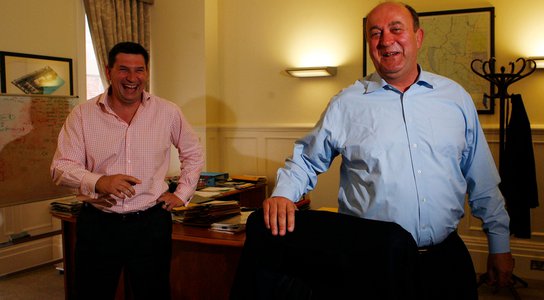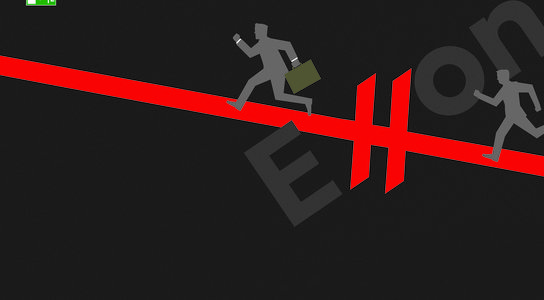Updated 31 July 2019 - see below
A controversial mining entrepreneur claims Liberia has cleared him of bribery allegations – only for a top Liberian politician to denounce this as a “blatant and utter lie”. Now Global Witness is calling for the London Stock Exchange and its scandal-ridden little brother, the £103 billion Aim stock market, to bar him for good, as he seeks to relist his assets in the City.
Having been forced off London’s junior stock exchange over one of West Africa’s biggest corruption scandals, a company set up by former England spin bowler Phil Edmonds and City entrepreneur Andrew Groves is back in business. There is only one problem: Groves’ claims to have been cleared of high-level bribery allegations in Liberia are “a blatant and utter lie”, according to a leading lawmaker there.
Edmonds and Groves were once feted as “resource rock stars” in the financial press, listing nine companies on the UK’s loosely governed Alternative Investment Market (Aim), including one that became the exchange’s third largest. But in May 2016, Global Witness published The Deceivers, which exposed how Edmonds and Groves scammed stock market investors, bribed African officials and intimidated business rivals. A swath of Liberia’s political elite had been paid off by the pair’s company Sable Mining in its pursuit of a huge iron ore concession. Sable Mining was forced to delist from Aim and Liberia’s last president, Ellen Johnson Sirleaf, set up a task force to investigate the allegations. Then Prime Minister David Cameron wrote to her about the scandal, saying – according to a statement by the Liberian presidency – that information on the bribery allegations would be passed to UK law enforcement and that the UK would “cooperate with you to tackle corruption wherever it occurs”. The Liberian task force indicted Sable Mining and Groves, along with numerous Liberian politicians including the ruling party chairman - and Sable’s lawyer - Varney Sherman and the Speaker of parliament Alex Tyler. All have denied wrongdoing. Edmonds resigned from Sable’s board in 2014 and eventually relinquished his shareholding in the company, according to its spokesman.
To the surprise of many, however, this February joint founder Groves issued a public statement to announce the complete acquittal of himself and Sable, now renamed Consolidated Growth Holdings. The statement said there had been a “comprehensive review by the Liberian authorities” into the indictments. Giving the impression of quoting directly from this purported review, the statement claimed it had concluded, “Sable Mining and Andrew Groves had not ‘in any form, manner or shape interacted with any public official within the Liberian Government in an improper or illegal manner’ in respect of their business activities in Liberia.”
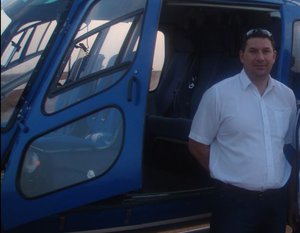
Andrew Groves' litany of scams and bribery crisscrossed the African continent (credit Global Witness)
But according to a leading Liberian lawmaker this is untrue. Fonati Koffa was chairman of the presidential task force until early January, leaving the post about a month before Groves’ statement. He is now head of Liberia’s House of Representatives Judiciary Committee. Asked to comment on Groves’ claims, Mr Koffa was unequivocal: there was no review.
“This is a blatant and utter lie,” he said. “There is no comprehensive investigation I am aware of that exonerated these people. As former chairman of the task force I would have been notified, as no other body would have been clothed with the authority to conduct such a review.”
“We remained convinced of their complicity and guilt,” he continued. “I defy Sable Mining or whatever group they have morphed themselves into to produce such a report or the government official who conducted it.”
A senior official still involved in the prosecution of Liberian officials involved in the bribery case, speaking on condition of anonymity, said he had not heard of a review either. “We had the evidence,” he said. “How can we now be saying this [Sable’s bribery] didn’t happen?” And Eugene Fahngon, Liberia’s deputy information minister, was also unaware of any review.
Groves said in his statement that all charges against him and Sable “have been irrevocably dropped by the Liberian authorities”. But Koffa said this was not the case. While Koffa and other officials acknowledged that a nolle prosequi – a decision to drop charges without necessarily conceding innocence – had indeed been filed by a task force official with the Supreme Court, he said “if Groves ever sets foot in Liberian jurisdiction those charges could easily be reinstated”. He also said the nolle prosequi was “improperly filed” and so, in practice, “there is nothing to act on”.
These comments suggest that the unattributed quotes forming the centrepiece of Groves’ audacious declaration were not, as a reader would infer, the view of the Liberian authorities. Instead they appear to have been statements made to the Liberian press by his own lawyer, Sayma Syrenius Cephus. Mr Cephus was also quoted in the press saying the prosecution had come “to the stark realisation that neither Sable Mining Africa nor Andrew Groves had any criminal intent”. But in an email to Global Witness, the lawyer was more ambiguous. “Only the prosecution can clarify” why the nolle prosequi was filed, he said. “Perhaps a holistic and comprehensive review” had “discovered an error of judgement”.
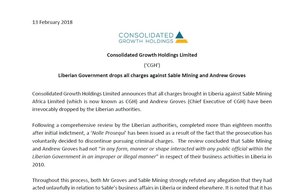
A reader of Groves' statement would assume the quotes exonerating him were attributable to the Liberian authorities. But they seem to have come from his own lawyer.
His good name supposedly restored, Groves told Bloomberg he planned to relist his Zimbabwean mining assets in London. According to stock exchange announcements, the coal-mining licences – which currently belong to Consolidated Growth Holdings - would be listed on the more prestigious London Stock Exchange, rather than Aim.
CGH plans to list its Zimbabwean assets through a stock market manoeuvre known as a “reverse takeover”: a smaller company, Contango Holdings, has announced an agreement to buy the more valuable CGH mining asset. Shares in the resulting merged entity would trade on the London Stock Exchange. A Contango spokeswoman claimed that Groves would not have a formal position in the company and that “he will have no involvement in Contango and/or its Zimbabwe business after the transaction”. However, she admitted he will be a shareholder— and therefore stands to profit if the company prospers. Not only that but Groves said in the Bloomberg interview that “I’d like to build it into a mid-tier mining company”. He went on to boast of knowing the new Zimbabwean president Emmerson Mnangagwa for 15 years, adding that he has a lot of local contacts. From this it is clear that far from a simple asset sale, Groves intends to be intimately involved with the new venture.
Groves’ return to Zimbabwe may not be welcomed by all, however. He and Edmonds are notorious there for a mining deal in which their company lent $100 million to former ruler Robert Mugabe on the eve of his victory in a crooked and violent election. Mnangagwa, who succeeded Mugabe last November, has promised “zero tolerance towards corruption” - but he is not free of controversy himself. In 2001 Global Witness revealed how he led a business empire in the Democratic Republic of Congo during a civil war that killed millions. In return for Zimbabwe supplying troops to fight alongside the Congolese government, the companies overseen by Mnangagwa were allowed to mine diamonds and log prime rainforest.
Global Witness’s 2016 report had detailed bribes and questionable payments from Sable Mining in Liberia totalling almost $1 million. Groves’ lawyer and fixer Sherman emailed him a spreadsheet of such ‘facilitation’ payments and Groves continued sending funds to his man. Groves was also accused by the Liberian task force of bribing the mining minister and his deputy $250,000 in hard cash each (denied by the officials in question). And there were more disturbing undercurrents: Global Witness’s report revealed how the duo’s agents intimidated and hacked rivals, leaving some in fear of their lives –allegations Edmonds and Groves said were groundless. In his affidavit to the Liberian Supreme Court in January, Groves acknowledged having received the bribes spreadsheet but said he “did not review the contents”, having delegated authority to Sable Mining’s local staff. “Sable Mining and Andrew S. Groves are innocent victims,” Groves insisted.
After being contacted about the contentious public statement, Groves’ spokesman said: “Mr Groves and Sable Mining always maintained that they had not acted in an improper or illegal manner, and the Liberian authorities have now reached the same conclusion.” The spokesman would not say who conducted the purported review, nor provide Global Witness with a copy. He added that Edmonds was no longer a shareholder and said neither man had acted illegally or unethically at any time. “We consider this matter as now closed,” he said.
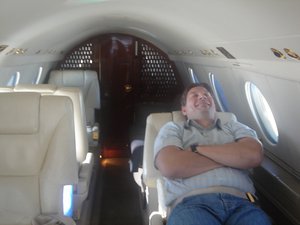
Groves, pictured here on his private jet, lived the high life with his dishonest gains (credit Global Witness)
In Liberia, the case is a bellwether for Liberia’s new president and former football superstar George Weah, who came to power in January. In his inauguration speech, he said: “The most effective way to narrow the gap between the rich and the poor is to make sure public resources do not end up in the pockets of government officials.”
But Liberian media has already raised numerous corruption red flags over Weah’s government. And the latest Groves controversy follows the announcement of a new investigation into bribery and corruption in Liberia’s oil sector involving ExxonMobil, also first revealed by Global Witness. (ExxonMobil also denies wrongdoing). If the host of officials indicted over Sable Mining’s bribery do not face trial these worries will be heightened.
Here in Britain the authorities should pay attention too. The Deceivers showed how Edmonds and Groves’ bribery scheme was part of a package of trickery. City lawyers crafted sophisticated stratagems using anonymously owned companies in the British Virgin Islands to repeatedly fleece ordinary investors on Aim. Both Aim and the Serious Fraud Office have been fully informed about these cases, but are yet to take action. Fraud and corruption scandals regularly plague the top tier of Aim-listed firms, yet repercussions are rare to non-existent. Aim has continually insisted it has “absolutely the right regulatory framework”. But the junior market has become a haven for rogue companies – and now one of the most notorious hopes to clamber up onto the main London Stock Exchange. UK authorities should not let Edmonds and Groves get away with bribery and swindling, and the London Stock Exchange and Aim should bar them and the companies for good.
Update: On 30 July 2019, following a trial at criminal court C in Monrovia, Liberia, Judge Peter Gbeneweleh, acting as judge and jury, acquitted those on the indictment of all charges, it was reported. The defendants faced counts of economic sabotage, bribery, criminal facilitation, conspiracy and solicitation and had denied the charges.
